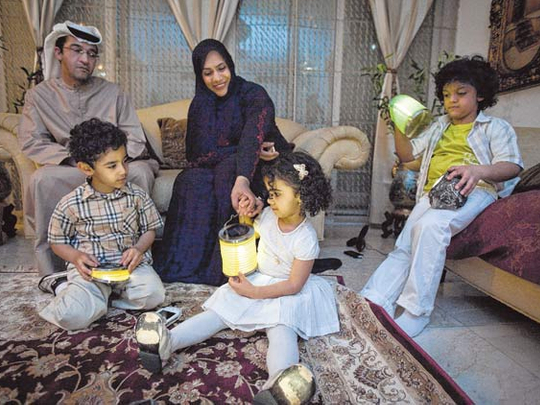
Abu Dhabi: An Emirati family is among nine worldwide taking part in a competition by National Geographic which aims to challenge the participants to reduce their carbon footprint.
The participation of the Emirati family in the National Geographic 360° Energy Diet Challenge has been arranged by National Geographic Al Arabiya that is published by Abu Dhabi Media Company and distributed across the pan-Arab region.
The National Geographic launched a campaign under the slogan the "360 Energy Diet Challenge".
In this campaign, families around the world were selected for a 12-week competition to make measurable changes in six areas of their lives.
The family of Mohammad Ali Al Nowais in Abu Dhabi was selected to take part in this initiative.
Al Nowais, his wife Budoor and their three children will now compete against eight other families in Canada, Slovenia, Mexico, Egypt, Japan, Sweden, India and the US in a series of energy-saving challenges that attempt to reduce the families' carbon footprint.
‘There's more we can do'
On his family's involvement, Al Nowais said: "We were thrilled to find out that we have been selected to represent the UAE. Energy-saving and environment awareness are already an important part of our lives, but we still believe there is a lot more we can do to reduce our carbon footprint."
Al Nowais is an accounting manager at the Ministry of Culture, Youth and Community Development in Abu Dhabi
"I hope our efforts will set an example for other UAE families on how to save energy," Budoor, a graphic designer for an Arabic daily newspaper, told Gulf News.
"I thought the task was simple, but as I researched I realised there is a lot more to do than just switching off lights," Budoor said. "We began purchasing as much organic food as possible and eat one vegetarian meal daily; this turned out to be a healthy option. We also convert throw-away food into useful fertiliser," Budoor said.
The Al Nowais family started to replace their home appliances with energy-efficient machines.
They also bought a device that stores solar energy which can be used to operate small appliances like mobile phone chargers.
"I couldn't use public transportation, so I started car pooling and, most importantly, began to use our cars more intelligently. I now organise our errands to minimise the number of cars we use simultaneously, and the time the car runs. We also removed the excess weight in the cars," said Budoor.
Creating a safer environment is a responsibility shared by the people and governments alike. The Al Nowais family hopes the government implements simple rules that can impact the environment.
The government can implement policies to improve drinking water quality, thereby reducing dependency on bottled water. Also, recycling bins are not available everywhere.
"I had to make my own at home and taught my kids how to deal with household waste. We can teach that in school and help educate our children on the benefits of a safer earth. I reward my kids for recycling in an attempt to make it a life-long habit," Budoor added.
At the end of the challenge, the household with the most points will be featured on NationalGeographic.com and may be invited to appear on a live panel about the experience.
"Even if we don't win the competition, we are happy to be taking part in this event and making a difference," Budoor said.
How the challenge works
Households will receive a set of action items in six different areas, each worth a certain number of points. The more changes a household can make, the more points earned.
Participants will self-report their progress weekly. Each household will be featured in a blog about the challenge.
Changes: What they are doing
- Organic food purchase
- A vegetarian meal per day
- One vegetarian day as frequently as possible
- Reduction of daily protein intake
- Ban of canned food and beverages
- They bought a device that converts the throw-away food into fertiliser
- Replacing home appliances with energy-efficient machines that save water and electricity
- They bought a device that stores solar energy which they use to operate small appliances like mobile phone chargers
- Car pooling
- Use of one car for one errand
- They took out the excess weight in the car
Are you working to reduce your carbon footprint? Are you doing anything unique? What changes would you like to see the UAE make to help reduce its footprint?












